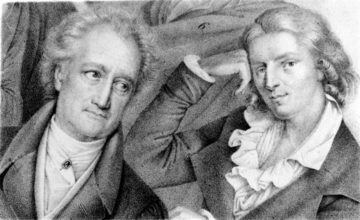Freya Johnston in Prospect Magazine:
 Andrea Wulf’s substantial yet pacey new book concerns itself with a dazzling generation of German philosophers, scientists and poets who between the late 18th and early 19th centuries gathered in the provincial town of Jena and produced some of the most memorable works of European romanticism.
Andrea Wulf’s substantial yet pacey new book concerns itself with a dazzling generation of German philosophers, scientists and poets who between the late 18th and early 19th centuries gathered in the provincial town of Jena and produced some of the most memorable works of European romanticism.
Perhaps the most wonderful account of this group’s intellectual and emotional life published in English is Penelope Fitzgerald’s 1995 historical novel The Blue Flower. For that book’s epigraph, Fitzgerald chose a comment made by Friedrich von Hardenberg, the man later known as Novalis: “Novels arise out of the shortcomings of history.” This fragmentary thought is both allusive and cryptic. We might take it to mean that novels pick up where history leaves off; that fiction comes into being in order to chart the private, intimate, domestic aspects of life rather than the large-scale, public sweep of grand events that governs a conventional historical narrative. Novels implicitly challenge the priorities of history, inviting us to look within and to reconceive the world. Novalis, himself a wildly experimental writer of fiction and a poetic thinker of terrific originality and insight, argued strenuously for the need to romanticise and revolutionise our surroundings according to what we find inside ourselves: philosophy, he said, originates in feeling.
Fitzgerald’s response as a novelist to that call—to recognise the primacy of individual sensations—was to write in such an unobtrusively informed and tactful way as to convince us that she personally knew the characters about whom she was writing. Conveying her sense of the past through beautifully assured, delicately economical glimpses of the Hardenbergs and their circle at home in the 1790s, her style is as clipped and fragmentary as that of her philosophical subject, intimating via imaginary reconstructions a world of familiarity with private love, pain and grief.
More here.
